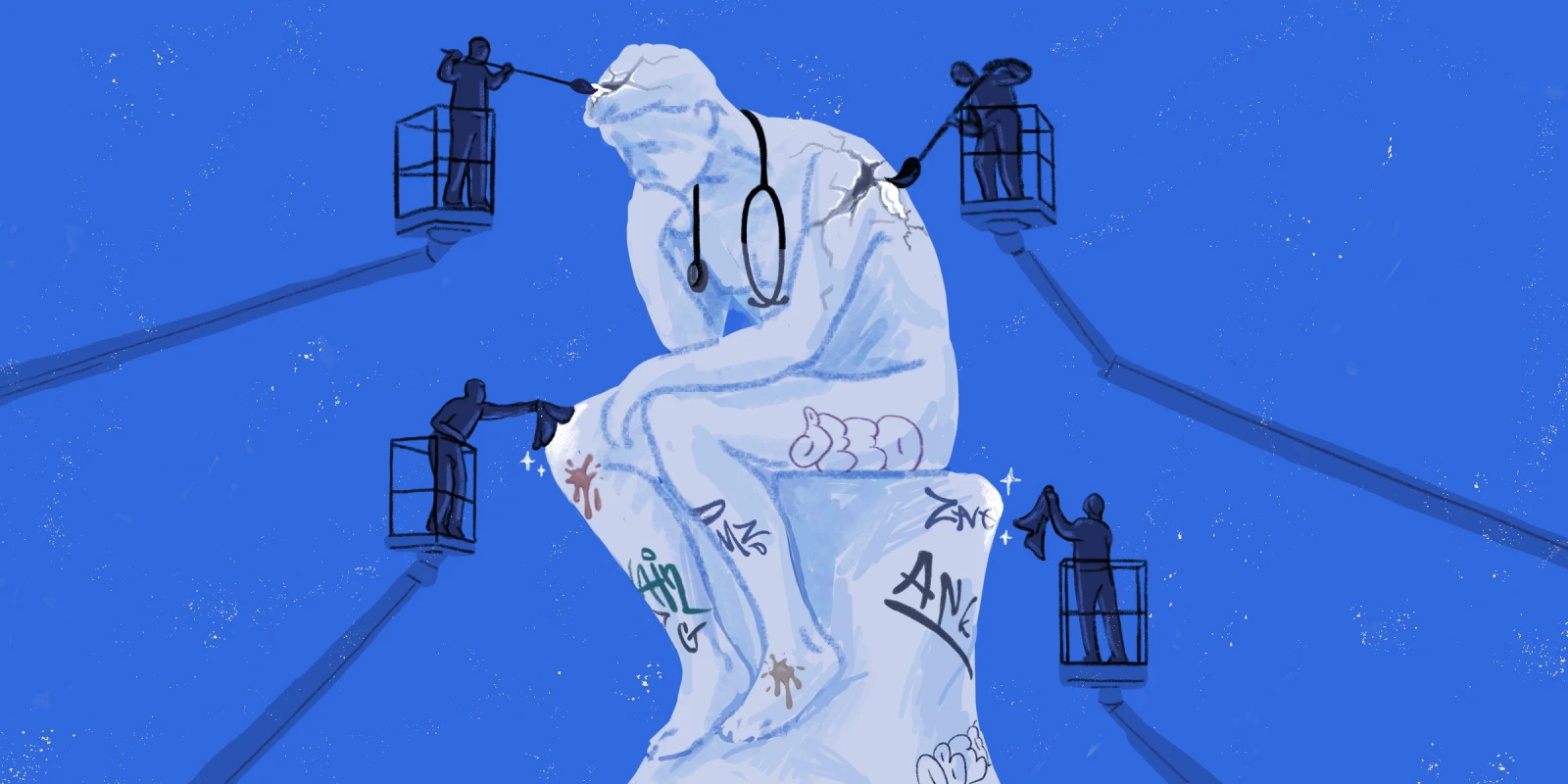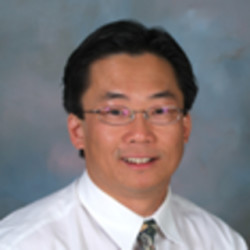Lately, I have been haunted by the specter of Dr. Hawkeye Pierce. He is the witty, sarcastic, and talented fictional war surgeon and the protagonist of the sitcom “MASH,” which is set during the epic catastrophe of the Korean War. I watched a lot of reruns of this show when I was a teenager, and it unintentionally formulated my first mental picture of doctors and subconsciously nudged me in the direction of medicine.
I have relied on Hawkeye to help me understand what is going on with medicine since 2020, when war was a metaphor for acute-phase pandemic medicine, and when doctors were “front-line workers.” Recently, Hawkeye has been on my mind even more because the 2023 version of pandemic medicine has a strong post-combat veteran vibe. My attention was particularly drawn to a number of recent articles about moral injury in medicine. After reading these articles, my first reaction was to hit the “like” button multiple times. Second, I had a strong sense of recognition that I had felt this way many times before. Third, I agreed with the writers who said that this was not new at all. My early experience with Hawkeye implanted in me a subconscious expectation that moral injury was always part of the job. When you are in a profession that is as personal and humane as medicine, you are in a moral profession.
Over the course of training and 20-plus years of practice, well before combat psychology was applied to doctors, I've had to ask myself what I think are the defining questions of moral injury, “Am I on the ‘good’ team, or the ‘bad’ team?”; and “Why is it so hard to live a more moral life?” I have, at times, been witness or complicit to implementing decisions that I felt were morally ambiguous, if not morally questionable. Sometimes these decisions can happen in the name of progress and fame (and can be moral disasters, like Tuskegee or Cecil Rhoads). Even as a private practitioner, morality is very difficult to disentangle from its ignoble imposters, marketing, microeconomics, and politics.
Academics and industry watchdogs are more equipped to litigate the troubles of our institutions. My point as an individual practitioner is that there has always been an expected undertone of tension, if not conflict, between our personal morals and that of our institutions; and that I have never had the power, privilege, or pride to deny the moral imperfections of our profession.
What I have done, and have seen others do, is to try to shield myself from self-sanctions by various methods of moral disengagement, which is the equivalent of a keloid, or worse, atrophy of the conscience. I can recall examples and modeling of disengagement mechanisms such as pseudo-moral justification, euphemistic labeling, diffusion of responsibility. The danger to the profession that worries me the most is the current wave of moral injury leading to refugees of conscience, who either exit medicine altogether or practice medicine in an increasingly morally disengaged manner. I worry about the long-term loss of morals in the profession, but I know that I would much rather work with colleagues who have the capacity and vulnerability to suffer moral injury, than those whose morals cannot be injured or even questioned.
Moral injury is “trending” now due to the global pandemic and its economic repercussions, because the greater the trauma, the more honesty is needed to understand it. However, the trauma to our profession and our patient population can’t be entirely new, since there are and have been other epidemics (e.g., AIDS, gun violence, poverty). Our profession, like our society, is changing. We are becoming much more diverse, so we see a receding of conformity, loyalty, rigid identity, and allegiance to time-imposed norms. History tells us that soldiers have experienced moral injury in every war, but the psychology behind it has developed more since the wars in Vietnam, Iraq and Afghanistan. Similarly, the COVID-19 pandemic has sparked an increase in awareness of emotional and mental health of health care workers. What is new is that the medical field, outside of psychiatry, is finally seeing mental and emotional health from the inside. We are moving from sympathy to empathy. We are also beginning to realize that, independent of burnout, the mental health of health care workers is itself a health care crisis.
The question for the individual, when one has had a dark night of the soul in the clinic, is what to do. A number of solutions have been proposed for moral injury, including education, dialog, and consultation. I think these top-down countermeasures are long overdue, but it's sort of like asking the system to fix itself. The more immediate issue is with the hopelessness, despair, and loss of purpose for the individual practitioner. I think that the only answer to moral injury is moral healing.
So, how do we doctors take on the moral healing of ourselves? To say that I have the answer would be as pretentious and naive as to say, “I can cure cancer.” The conscience is a vital organ that we cannot learn about in our biochemistry or physiology courses, so we cannot approach it with the traditional scientific religiosity approach of labs-radiology-pill. And yet, there are several ways to begin that are time-honored and require us to recall the lost art of medicine:
Compassion. Sincere caring and kindness have always been essential components of how we treat patients, and we need to apply that to ourselves when moral injury happens. Only a person who has morals can be morally injured, and a person who doesn't have morals is probably not compassionate. Just as crucial and more difficult is applying compassion to our colleagues, including those we may blame for contributing to our moral injury.
Humility. Although it may go against our training, let us not hang on too tightly to perfection. A moral physician is not a superhero. We can’t do it all ourselves. We can't punish ourselves for things we are powerless to control.
Moral healing is not moral scarring. We need moral resilience not moral shields. It can be hard, but let us feel the gratitude of being allowed the privilege of being a doctor, a gratitude that we all felt when we first put on the white coat. Let's allow ourselves to feel the joy that comes when we can help heal others, and then let us use that joy to heal ourselves.
Nourish our moral self. There is an old story that says our psyche is like two wolves in constant battle. One wolf is good, compassionate and generous, and the other is resentful, angry and greedy. The wolf that wins is the one we feed. Morality and conscience is a constant struggle, and for some of us requires spiritual practice. It isn’t a diploma on the wall to show that we are elite, nor a hammer for shaming others. Our conscious self needs to evolve and have input from our surroundings, so it needs dialogue and relationships.
Forgiveness. We all learned the Kübler-Ross model of grief in medical school, and this taught us that acceptance is the preferable stage of dealing with death. Similarly, moral injury may be just as inevitable, but not final. The preferable psychology for moral healing and what moral disengagement avoids is forgiveness for ourselves as individuals and our profession as a whole. Healing, health, and recovery is what our profession is all about. Let us apply that to ourselves.
What approaches have helped you or your colleagues address moral injury and burnout in medicine? Share your experiences below.
Jimmy Leung is a musculoskeletal and MRI radiologist with 20-plus years of experience. He grew up in Hawaii, studied and trained for many years on the East Coast, and now works in the Southwest. Dr. Leung was a 2022-2023 Doximity Op-Med Fellow.
Illustration by Diana Connolly







